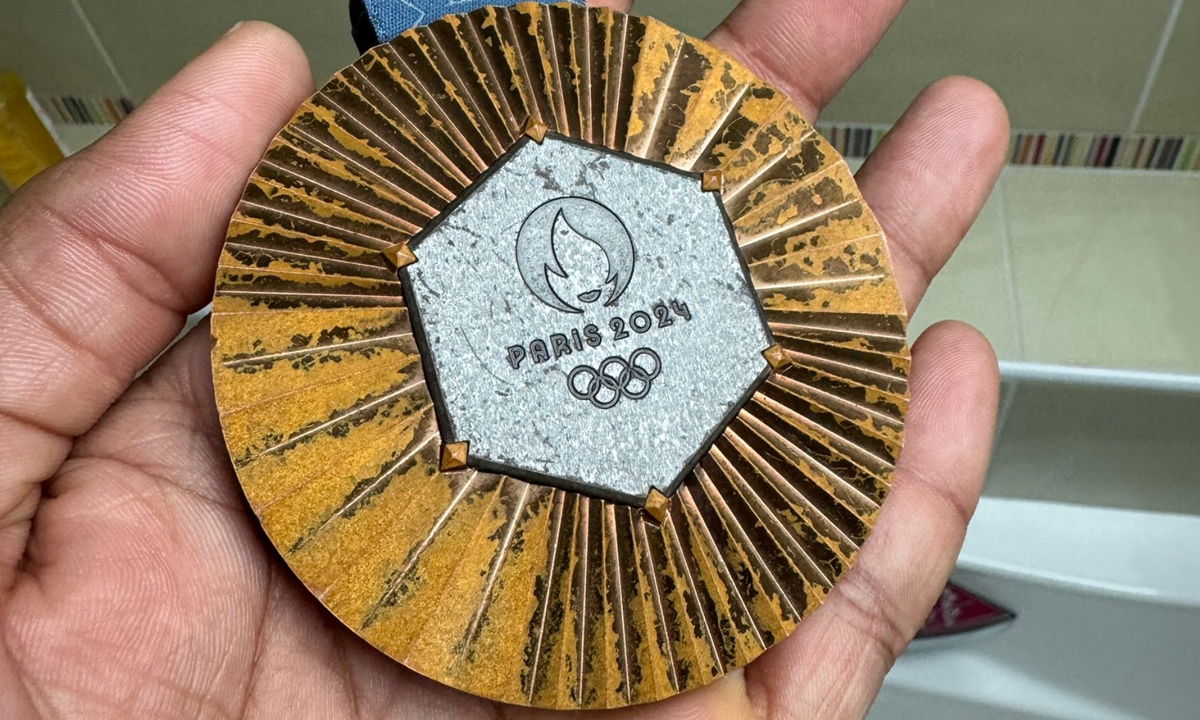

Winning an Olympic medal is the moment every athlete dreams of whether it’s gold, silver, or bronze, it’s the result of years of hard work, tears, and blood. And then, after winning, there’s the thrill of proudly showing it, maybe on a show table at home, where it shines as a symbol of that achievement. But what if, just a few months later, that shiny prize starts to lose its luster? The excitement fades as the medal begins to deteriorate. It’s something no one expects after putting in so much effort. Yet, lately, Paris Olympics bronze medals, in particular, have been in the news for exactly that, losing their quality, chipping, and fading away.
Watch What’s Trending Now!
Even though it’s been four months since the Paris Olympics ended, the Games are still making waves in the news. From the opening ceremony to the protests that followed, there was no shortage of drama. But now, here’s the real head-scratcher: French swimmer is speaking out about his Olympic bronze medal, which is reportedly developing moldy black spots just months after the Games. How does this happen? How can something so hard-earned, something that represents all that effort and achievement, start to deteriorate so quickly?
ADVERTISEMENT
Paris Olympics Bronze medals are cracking, chipping, and flaking
On December 27, Mr. Carter shared a post on X showing a bronze medal with black spots and signs of deterioration. The caption read, “Not Clement Secchi’s bronze medal that is flaking.” Turns out, it was actually Secchi’s medal from the 4×100-meter medley relay at the Paris Olympics. Secchi had first shared a photo of his medal on Instagram Stories, showing the damage, and the image quickly spread across X.
Then, Yohann Ndoye-Brouard revealed he had the same problem. Secchi described his medal’s appearance as “crocodile skin,” and Ndoye-Brouard humorously compared his to a medal from the 1924 Paris Olympics. But here’s the big question: are these issues limited to French athletes, or is there a bigger problem with the medals themselves?
Top Stories
Tom Brady Makes Career Announcement for Vegas as Pete Carroll Addresses Losing Raiders Locker Room

Dolphins’ Jordyn Brooks Publicly Calls Out Locker Room Over ‘Poor’ Performance Against Steelers

Cam Newton Makes NFL Return Conditions Clear to 32 Teams as Panthers Legend Confirms Retirement Stance

Caitlin Clark Shows Concerning Signs vs. Kelsey Plum During USA Camp Debut, per National Reporter

Andy Reid Makes Final Decision on Signing New Chiefs QB After Patrick Mahomes’ ACL Injury

When an American Legend Confessed to His Long Kept Promise to Dale Earnhardt That He Still Honors

Pas la médaille de bronze de Clement Secchi qui s’écaille 💀💀#Paris2024 pic.twitter.com/Dv7YOVxLMN
— MR.CARTER (@NelsonCarterJr) December 27, 2024
ADVERTISEMENT
It looks like this problem isn’t just affecting French athletes. American skateboarder Nyjah Huston, who placed third in the men’s street final also spoke up about the quality of the medals, saying, “These medals look great when they’re brand new. But after wearing it and sweating a little, or letting my friends wear it for the weekend, it’s clearly not as good quality as you might think.”
The issue seems to be mostly with the bronze medals, which has left athletes from different countries pretty frustrated. While the medals were awarded despite the issues becoming apparent just days after athletes received them, it seems the problem may not be fully resolved as it is, “bronze” but not made of Bronze, and this fact can’t be changed. However, there is still a solution that could help ensure your medal lasts much longer!
ADVERTISEMENT
Athletes furious over damaged medals – will they be replaced?
The Paris 2024 Olympic bronze medals have sparked concern, with athletes reporting discoloration and deterioration just days after receiving them. Despite being called “bronze,” the medals are made up of 97% copper, 2.5% zinc, and 0.5% tin. Could the damage be caused by copper oxidation, a natural reaction with oxygen that’s accelerated by sweat and exposure to the environment? In this respect, specialists recommend that these medals should be coated to help avoid such incidences, but it seems that this aspect of the coating was not well observed when the medals were being manufactured.
Following the negative comments from top athletes such as Nyjah Huston, Clement Secchi, and Yohann Ndoye-Brouard, the organizers of the Paris 2024 Olympics have faced criticism over the quality of the medals. Paris 2024 representatives said that there were problems with that and assured that they would coordinate with the Monnaie de Paris which is in charge of minting those medals in order to find out how those damages occurred. They agreed that any medals that had been damaged, including Huston’s, Clement Secchi’s, and Yohann Ndoye-Brouard’s, would be replaced as a continuous cycle and engraved as per the actual one.
ADVERTISEMENT
Despite these promises, the question remains: how did such a prestigious event, renowned for its attention to detail, end up with medals that are so easily damaged?
ADVERTISEMENT
ADVERTISEMENT
ADVERTISEMENT

